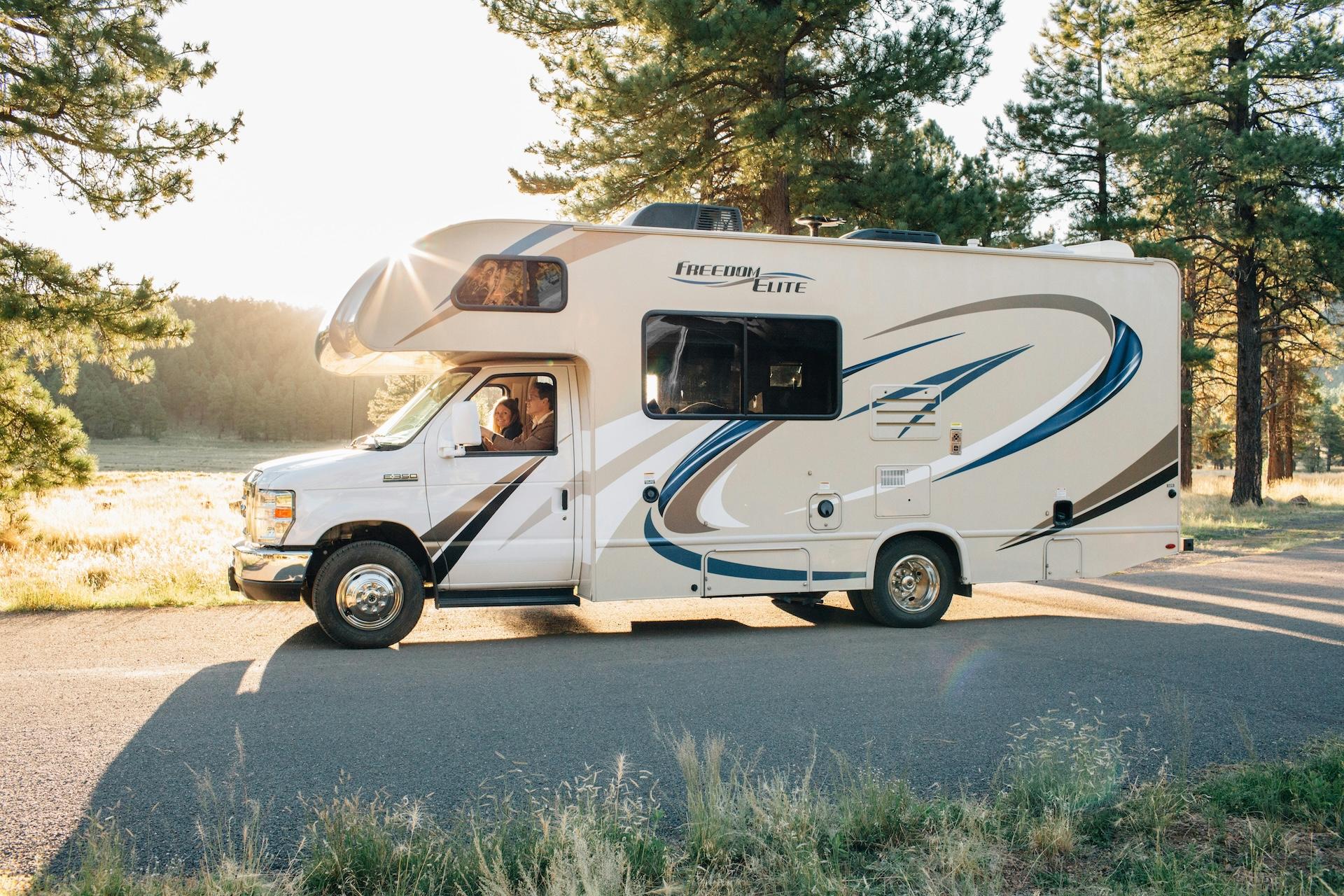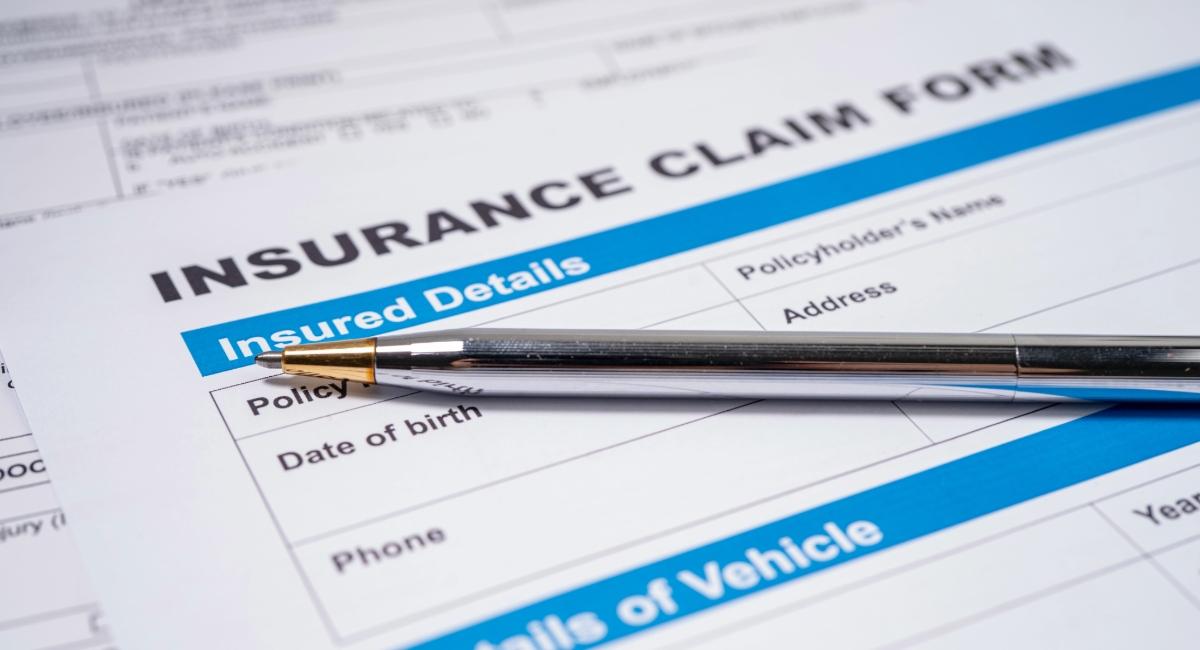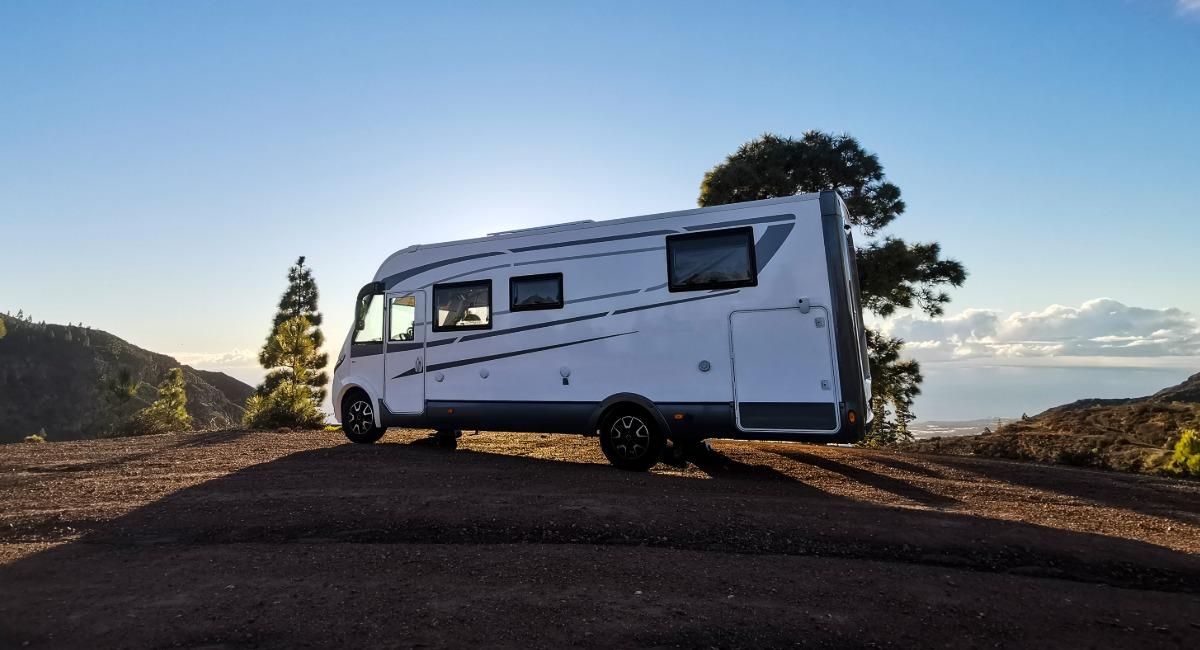Apr 7, 2021
Types of RV Insurance Plans: Complete Coverage Guide
Types of RV Insurance Plans: Complete Coverage Guide
Discover essential RV insurance coverage types, including liability, comprehensive, collision, and full-timer protection. Compare options for Class A, B,and C motorhomes and towables.
Insurance products
Blog Post
Education

TL;DR: Your RV Insurance Coverage Guide
RV insurance combines auto and homeowners protections, with liability coverage required by most states for motorhomes. Key coverage types include comprehensive (weather, theft, vandalism), collision (accidents), contents protection for personal belongings, and specialized options like full-timer coverage for RV residents. Coverage needs vary by RV class (A, B, C motorhomes vs. towables) and usage (weekend trips vs. full-time living vs. rentals). Most policies include roadside assistance, uninsured motorist protection, and medical payments coverage regardless of fault.

What Types of RV Insurance Coverage Do You Actually Need?
The type of RV insurance you need depends on your rig's class, how you use it, and whether you drive or tow it.
RV insurance isn't just auto coverage; it's a hybrid that protects both your vehicle and your mobile lifestyle. Think of it as auto insurance meets homeowners protection, designed specifically for life on the road.
With over 11.2 million households now owning RVs according to the RV Industry Association, understanding the right coverage has never been more important. Don't worry, we've all been there—staring at insurance options, wondering what actually matters for your adventures. Let's break this down without the jargon so you can hit the road with real peace of mind.
The Foundation: Required vs. Optional Coverage
Almost every state mandates minimum liability coverage for motorized RVs, but these minimums are often too low to protect against significant accident costs; higher limits are strongly recommended for valuable RVs and assets.
How Does Liability Coverage Protect You on the Road?
Liability coverage pays for damage and injuries you cause to others, with most states requiring minimum limits that may not adequately protect your assets.
If your RV is in an accident and it's your fault, liability coverage helps with damage and medical bills for the other party. But here's what that really means for your wallet and your peace of mind.
Almost every state mandates liability coverage for motorized RVs, according to the National Association of Insurance Commissioners (NAIC), which oversees insurance regulation across all 50 states.
Bodily Injury Liability
Covers medical bills, lost wages, and legal costs if you injure someone in an accident. The minimums most states require? Often, nowhere near enough if you're dealing with serious injuries.
Property Damage Liability
Pays for repairs when you damage someone else's property—their car, a fence, even another RV. With today's repair costs, those state minimums can disappear fast.
What's the Difference Between Comprehensive and Collision Coverage?

Comprehensive covers non-collision damage (weather, theft, vandalism) while collision handles accidents, and you can add comprehensive without collision, but not vice versa.
Here's where things get interesting. These coverages protect your RV itself, not just the other guy's stuff.
Comprehensive Coverage
This is your shield against everything that's not a collision:
- Weather damage: Hail, wind, flooding
- Theft and vandalism: Damages or loss of property and possessions
- Fire damage: From campfires gone wrong to electrical issues
- Animal strikes: Deer don't check for RVs before crossing
- Falling objects: Trees, rocks, or that stuff that "came out of nowhere"
Collision Coverage
Straightforward—if you hit something or something hits you:
- Another vehicle
- A stationary object (pole, fence, median)
- Rollover incidents
Real talk: If you're financing or leasing your RV, your lender typically requires both comprehensive and collision coverage. They want their investment protected, and honestly, so should you.
Do You Need Special Coverage If You Live in Your RV Full-Time?
Full-timer RV insurance provides homeowner-style protections (including personal liability, emergency expenses, and loss assessment coverage), specifically designed for RV residents living in their vehicle for 6+ months per year.
If your RV is your home, your insurance should act like it. Full-timer coverage fills the gaps that regular RV policies leave open.
Key Full-Timer Protections:
- Personal Liability: Covers property damage at and away from your RV (like if you accidentally damage another RV's awning at a campground)
- Emergency Expense Coverage: Pays for temporary housing if your RV becomes unlivable after a covered loss
- Loss Assessment: Reimburses HOA fees for common area damage at RV parks
- Increased Personal Property Limits: Higher coverage for all the belongings that make your RV home
If you're considering the full-time RV lifestyle, our comprehensive full-time RV insurance guide breaks down everything you need to know about protecting your home on wheels.
How Do Coverage Needs Differ by RV Type?

Coverage requirements scale with your RV's size, value, and complexity, with Class A motorhomes needing the most comprehensive protection and towables requiring specialized considerations.
Not all RVs are created equal, so insurance policies shouldn't be either.
Class A Motorhomes (Bus-Style)
These are the luxury liners of the RV world—and they need coverage to match:
- Highest coverage limits recommended: You've got serious value to protect
- Consider agreed value policies: For those custom features and upgrades
- Enhanced content coverage: Expensive electronics, appliances, and furnishings need protection too
Class B Camper Vans
Smaller rig, different risks:
- Lower coverage limits often work: Due to their size and lower purchase costs
- Focus on the comprehensive: Urban parking means higher theft/vandalism risk
- Consider gap coverage: If you're financing and the loan exceeds the van's value
Class C Motorhomes (Over-Cab Design)
The middle ground that most people picture when they think "RV":
- Mid-range coverage: Between Class A and B requirements
- Standard auto-style limits are often sufficient: Unless you've added significant upgrades
- Good collision coverage is essential: Higher center of gravity means rollover risk
Towable RVs (Travel Trailers, Fifth Wheels)
These have a unique insurance setup:
- RV insurance covers the trailer itself: Comprehensive, collision, and contents
- Road incidents covered by towing vehicle: Your truck or SUV's auto policy handles liability while towing
- Focus on comprehensive storage: When it's parked at home or in storage
For a detailed breakdown of what's required and what's optional, check out our travel trailer insurance requirements guide.
What Additional Coverages Should You Consider?
Smart RV owners add roadside assistance, uninsured motorist protection, and contents coverage to handle the unique risks of mobile living.
These aren't just nice-to-haves—they're your backup plan when things go sideways.
Roadside Assistance
Like auto insurance roadside help, but built for RVs:
- Towing: Often higher limits than regular auto policies
- Tire changes and repairs: Ever try changing a dual rear wheel on the highway?
- Jump starts and battery service: RV electrical systems can be complicated
- Fuel delivery: When you miscalculate that last stretch to the gas station
- Lockout service: Because RV doors can be temperamental
Uninsured/Underinsured Motorist Coverage
This one's super handy, especially for expensive RVs. If someone hits you and they don't have enough insurance (or any), this coverage steps in. RV repairs aren't cheap, and you don't want to eat those costs.
Medical Payments Coverage
Covers immediate medical expenses for you and passengers regardless of fault. Think of it as first-aid coverage that kicks in right away, before health insurance starts processing claims.
Contents Coverage
Your personal belongings need protection, too:
- Accident damage: When your stuff gets tossed around during a collision
- Theft and vandalism: Laptops, cameras, outdoor gear—it adds up fast
- Weather events: Storm damage to belongings inside
- Bonus: Helps avoid filing claims on your homeowners or renters policy
Can You Rent Out Your RV and Stay Covered?
Most traditional insurers exclude rental coverage, but specialized policies like Roamly's allow peer-to-peer rentals through platforms like Outdoorsy without voiding protection.
Here's where many RV owners make mistakes. You hand over your keys to earn some extra cash, but standard policies often exclude coverage when you rent out your rig.
If you're thinking about Outdoorsy or direct rentals, make sure your policy specifically allows this, or switch to one that does. Roamly offers insurance that lets you rent out your RV through sites like Outdoorsy without losing coverage.
The last thing you want is to discover your policy doesn't cover rental activities after something goes wrong. With the right coverage, you can turn your RV into a profitable business while remaining protected.
Ready to Roll with the Right RV Insurance?
Whether you're chasing sunsets on weekend getaways or living full-time on the road, the right insurance helps protect every mile of your journey. And now that you know your coverage options, you’re one step closer to hitting the road with confidence.
From basic liability to full-timer protection, RV insurance isn’t one-size-fits-all, and it shouldn’t be. Tailoring a policy that fits your rig, your lifestyle, and your adventures makes all the difference when the unexpected happens.
Get a free quote with Roamly today and customize a policy built for RV owners, by folks who actually get what life on the road looks like.
RV insurance includes protections auto policies don't offer: contents coverage for your belongings, emergency expense benefits if your home-on-wheels becomes unlivable, full-timer liability protection, and specialized repair networks that actually understand RV systems.
Costs vary significantly based on RV value, class, usage, and location. You're typically looking at anywhere from $200 to $2,000+ annually, but the right coverage is worth every penny when you need it.
Yes and no. Your auto policy covers liability while towing, but the trailer itself needs separate RV insurance for comprehensive, collision, and contents protection. Think of it as protecting the trailer while your truck's policy handles the driving part.
It depends—do you drive or tow your RV? If you drive your RV, almost every state requires minimum liability coverage, just like any other vehicle. If you tow your RV, it's not required by law, but lenders and many campgrounds require proof of insurance.
Roamly Insurance Group, LLC ("Roamly") is a licensed general agent for affiliated and non-affiliated insurance companies. Roamly is licensed as an agency in all states in which products are offered. Roamly license numbers. Availability and qualification for coverage, terms, rates, and discounts may vary by jurisdiction. We do not in any way imply that the materials on the site or products are available in jurisdictions in which we are not licensed to do business or that we are soliciting business in any such jurisdiction. Coverage under your insurance policy is subject to the terms and conditions of that policy and is ultimately the decision of the buyer.
Policies provided by Roamly are underwritten by Spinnaker Insurance Company, Progressive Insurance Company, Safeco Insurance Company, Foremost Insurance Company, National General Insurance, Mobilitas Insurance Company, and others.
Connect
© 2026 Roamly All rights reserved.
